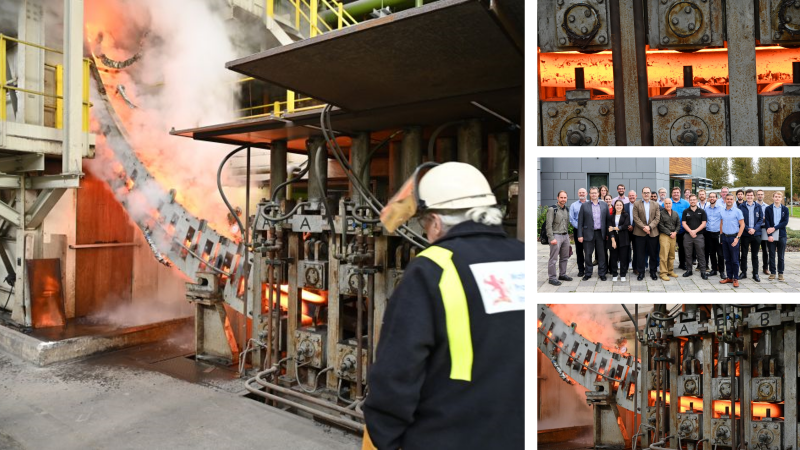Materials Processing Institute contributes to UK breakthrough in fusion-ready steel production

Press Release issued 10/01/2025
The Materials Processing Institute (MPI) has played a crucial role in the UK’s first large-scale production of fusion-ready steel – a groundbreaking development that promises to significantly lower manufacturing costs for advanced structural materials while enhancing the efficiency of future nuclear fusion power plants.
The breakthrough was delivered through the NEURONE (Neutron Irradiation of Advanced Steels) Consortium, a £12 million collaboration led by the UK Atomic Energy Authority’s (UKAEA) Materials Division, MPI and a network of academic and industrial partners.
Using its cutting-edge 7-tonne Electric Arc Furnace (EAF) at its Middlesbrough campus, MPI successfully produced 5.5 tonnes of fusion-grade reduced-activation ferritic-martensitic (RAFM) steel. These high-performance steels are essential for next-generation nuclear fusion reactors, engineered to withstand extreme conditions, including temperatures up to 650°C and intense neutron radiation.
The project focused on adapting EAF technology, integrating advanced purification and heat treatment processes. This innovative approach has the potential to reduce the cost of RAFM steel production by up to ten times.
Richard Birley, MPI’s NEURONE project lead and its Group Leader for Materials Development and Powder Metallurgy, said: “As the only UK facility capable of producing RAFM steel at this scale, this is a groundbreaking moment for nuclear fusion research and development. These trials mark a significant step towards cost-effective manufacturing of fusion steels for future commercial fusion programmes.
“MPI’s involvement in this project highlights its position as a national leader in the research and innovation that is driving the transition to a low-carbon future. By utilising its expertise and state-of-the-art infrastructure, we are playing a crucial role in positioning the UK at the forefront of nuclear fusion technology.”
David Bowden, Group Team Leader for Materials Science and Engineering at UKAEA and NEURONE programme lead, said: “One of the major challenges for delivering fusion energy is developing structural materials able to withstand the extreme temperatures and high neutron loads required by future fusion powerplants. The production of 5.5 tonnes of fusion-grade RAFM steel lays the foundation for cost-effective manufacturing of these materials.”
NEURONE has also produced more than 50 different variants of advanced reduced-activation ferritic-martensitic (ARAFM) steel alloys for analysis. An evolution of RAFM steel, this presents opportunities for specialist UK steel manufacturers to contribute to future activity, including forging, rolling, and optimising manufacturing processes.
The Consortium, established to research, test, and develop advanced steels, also includes representatives from the universities of Swansea, Sheffield, Birmingham, Imperial College, Manchester, Bristol, Strathclyde and Oxford, as well as Sheffield Forgemasters, and The Australian Nuclear Science and Technology Organisation.
In the News...
https://ccfe.ukaea.uk/researchers-mass-produce-fusion-ready-steel-in-uk-first/
https://www.pesmedia.com/ukaea-achieves-industrial-scale-fusion-grade-steel-production
https://www.iom3.org/resource/ukaea-s-fusion-grade-steel-no-longer-blue-sky-thinking.html
https://dignetsol.co.uk/news-resources/sustainability-tech-fusion-ready-steel-mass-produced-uk
https://www.steelradar.com/en/fusion-grade-steel-achieved-in-the-uk/
https://www.gov.uk/government/news/fusion-grade-steel-produced-at-scale-in-uk-first
https://interestingengineering.com/energy/mass-production-fusion-steel-uk
https://www.innovationnewsnetwork.com/fusion-grade-steel-produced-at-scale-in-uk-first/54375/
https://www.world-nuclear-news.org/articles/uk-consortium-advances-fusion-grade-steel-production
https://www.no2nuclearpower.org.uk/news/fusion-10-1-25/
13 January 2025


